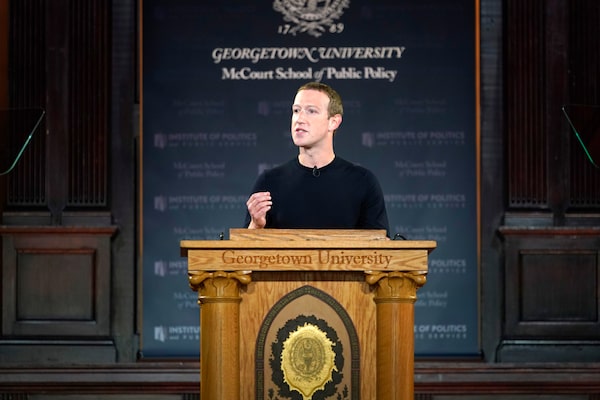
Facebook CEO Mark Zuckerberg signalled that Facebook intends to push back more aggressively against lawmakers’ efforts to regulate the social-media giant in an hour-long speech at Georgetown University.Riccardo Savi/Getty Images
Facebook Inc. chief executive Mark Zuckerberg signalled Thursday that he intends to push back more aggressively against lawmakers’ efforts to regulate the social-media giant, arguing in a rare public speech in Washington that U.S. tech companies play a critical role in safeguarding democratic values online.
In an hour-long talk at Georgetown University, Mr. Zuckerberg issued a forceful plea for lawmakers to protect freedom of expression on the internet, arguing against the dangers of what he called “an ever-expanding definition of what speech is harmful” and warning that the United States is in a race with China for control over the internet.
Mr. Zuckerberg’s speech comes as lawmakers in the U.S. and Europe raise alarm over Facebook’s role in election interference and the spread of misinformation and hate speech online.
The company is also facing criticism for changes to its platform that make it more difficult for third-party research tools such as The Globe and Mail’s ad-transparency project to collect information on political ads running on Facebook.
Multiple antitrust investigations by U.S. federal and state lawmakers have also been launched into Facebook and it has faced criticism from both Democrats and Republicans over how it moderates its platforms.
Despite unveiling several changes in the past year – including announcing the creation last month of an independent oversight board to police content – Mr. Zuckerberg has remained under fire from President Donald Trump and other Republicans who accuse Facebook of censoring conservative speech.
He has also raised the ire of Democrats over Facebook’s decision to exempt political advertisements from fact-checking, which critics say has enabled Mr. Trump’s re-election campaign to purchase ads spreading unsubstantiated allegations about former vice-president Joe Biden’s conduct toward Ukraine.
Facebook also paid a US$5-billion fine this year to the U.S. Federal Trade Commission for loose privacy practices that helped enable a Russian influence campaign in the 2016 presidential election.
“Right now, we’re doing a very good job of making everyone angry at us,” Mr. Zuckerberg acknowledged.
The speech marked a public shift for Mr. Zuckerberg, who has spent the better part of the past two years largely apologizing for his company’s mistakes and promising to do better.
It also served as a preview of what is likely to come next week, when he is set to testify before Congress for the first time in more than a year to persuade lawmakers to support Facebook’s efforts to create a blockchain-based global payments system.
Mr. Zuckerberg used his public address Thursday to press the case for why Facebook should be seen as a force for good in the world, characterizing threats such as political polarization as things that can only be overcome by allowing more people to participate freely in online debate. He said Facebook would fight any attempt to break up the company, which he said would impede efforts to curb misinformation and hate speech on the platform.
“We can continue to stand for free expression, understanding its messiness, but believing that the long journey towards greater progress requires confronting ideas that challenge us. Or we can decide the cost is simply too great,” he said in a speech that referenced the U.S. civil rights movement and wars in Iraq and Vietnam. “I’m here today because I believe we must continue to stand for free expression.”
While saying he supports some efforts to regulate the internet – including a national privacy law – Mr. Zuckerberg also cautioned the U.S. risks losing out in a global race with China if places too many restrictions on American technology companies. His arguments echoed the broader political concerns about China that have fuelled the Trump administration’s trade war with the country, and its efforts to block the use of Chinese-made technology from U.S. telecommunications infrastructure.
“Until recently, the internet in almost every country outside China has been defined by American platforms with strong free expression values. There’s no guarantee these values will win out,” Mr. Zuckerberg said, pointing out that six of the largest internet platforms today are based in China.
But his public appeal to lawmakers on both sides of the aisle appeared unlikely to have appeased Facebook’s critics.
“Mark Zuckerberg won’t take Americans’ privacy seriously unless he feels personal consequences for lying about his failure to protect your data,” Ron Wyden, a Democratic senator from Oregon, wrote on Twitter. Mr. Wyden is one of Facebook’s chief critics in Congress and has proposed jailing executives who lie to regulators about misusing consumer data.
A spokesperson for Mr. Biden’s presidential campaign issued a blistering statement after the speech, saying Mr. Zuckerberg’s ”choice to cloak Facebook’s policy in a feigned concern for free expression demonstrates how unprepared his company is for this unique moment in our history and how little it has learned over the past few years."